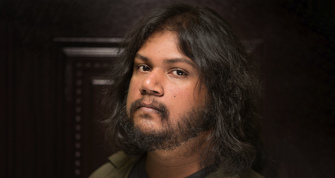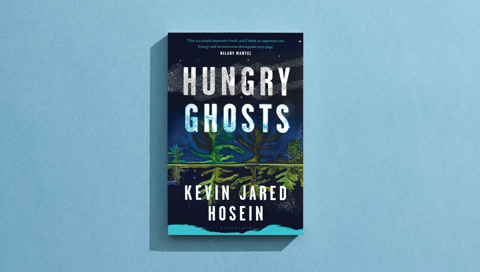Explore upcoming events

Kevin Jared Hosein is a Caribbean novelist and short-story writer from Trinidad and Tobago. He is best known for winning the 2018 Commonwealth Short Story Prize, the most global literary prize in the world, with his story Passage. His first adult novel, Hungry Ghosts, was published this year by Bloomsbury Publishing.
We spoke to Kevin ahead of his talk in August to find out more about his debut novel.
See Kevin in conversation with ABC RN's Kate Evans on 15 August, 6pm at the State Library of NSW.
What does the title Hungry Ghosts refer to?
The hungry ghost, or preta, is a figure in ancient Hindu mythology. It can be viewed as an incarnation of a person whose funeral rites have not been performed. Typically depicted as having a small mouth and a large belly, it suffers as it has no way to satiate its appetite. In this novel, the title fits almost any character that has unaddressed grief and loss. Many of the impoverished characters have dreams and no way to fulfil them. Appetites that cannot be fulfilled.
Hungry Ghosts is set in 1940s colonial Trinidad. What did exploring Trinidad of the past, tell you about Trinidad today?
How much of a frontier it must’ve felt like when the colonial machinery was slowing down. We hadn’t learned how to take care of each other yet, and for the longest while, the colonial powers never wanted everyone to get along. They had massacred people for celebrating Hosay together. And Trinidad had just come out of violent labour riots. The temperature was high. When they were packing up and leaving, there was this notion that we had unknowingly become each other’s enemies in that transitory period. It was interesting to gain a deeper knowledge of the fractures we still maintain between each other on these rocks.
You have mentioned that this novel was, in parts, shaped by insights from your grandfather’s life. What traces of his story can be found in Hungry Ghosts?
He helped me construct the world of not only 1940s Trinidad but what it would’ve felt like to grow up Hindu in a country that’d been set on continuously embarrassing and denigrating Hindus. He didn’t grow up in an estate barrack like the main characters but knew people who did. He passed away before the novel was published but not before it was acquired—he seemed proud of it. Many of the small domestic details and about boyhood in those times came from him and my father-in-law. How children waded through floods to find fish; pretending to be locomotives; and how much people sought to be in the company of others, even if it were the wake of a child.
This novel includes a rich cast of characters. Which character surprised you most while writing?
I’m always surprised by the readers who’ve become attached to the twins, Rustam and Rudra. They are like avenging angels in the novel, simultaneously within and outside of the main action. Marlee, definitely, is the one that surprises me the most. She’s a litmus test of a character. I’ve been privy to numerous opinions on her. Those who love her, those who hate her. She seems to evoke something raw and visceral in most readers who enjoyed the book, and I loved writing about her.
You’ve written short stories, books for young adults, and this is your first novel. What has each writing endeavour taught you?
Each experience has been totally different and I’m grateful that this literary undertaking of mine feels continuously new. It was slightly terrifying to write this book—I had never done any type of ambitious work like this before and I wasn’t sure if I could’ve pulled it off. I rarely ever write in third person and most works of mine are limited to a half dozen characters and set in contemporary times. Each of my works I want to be a celebration of Trinidadian Creole, whether it be fully narrated that way, or have it integrated amongst the arcane and the erudite.
